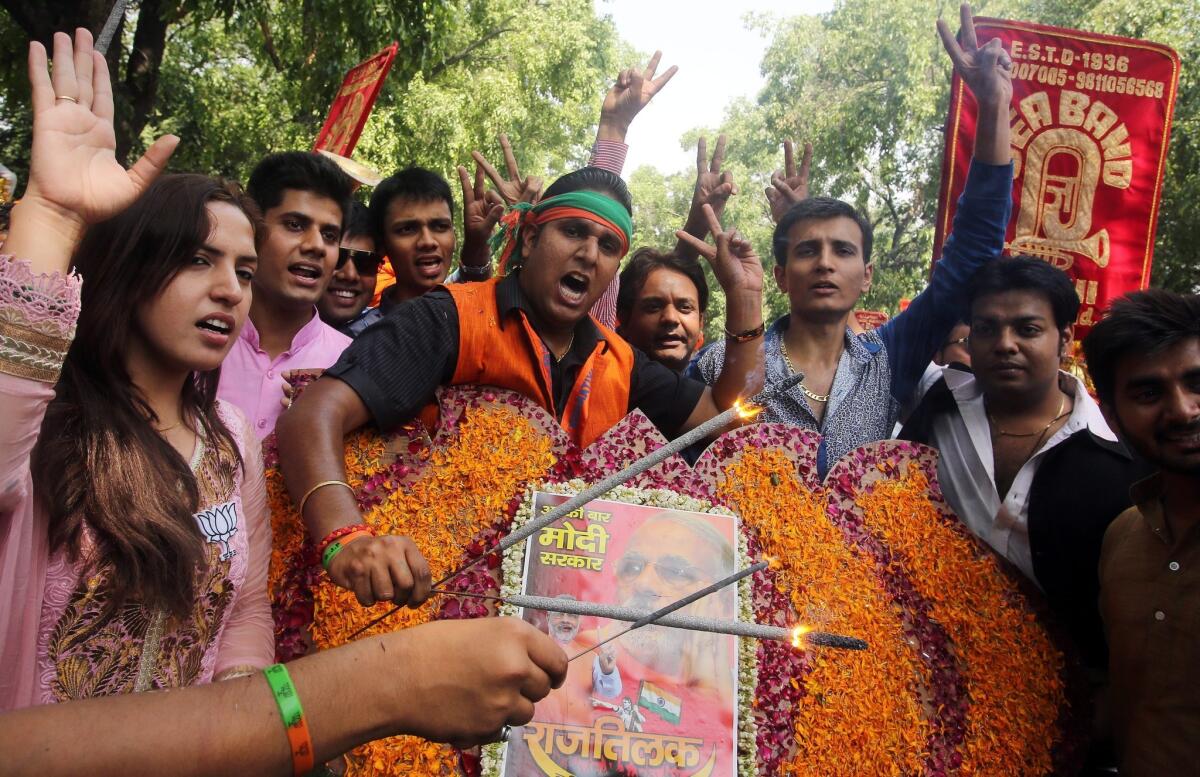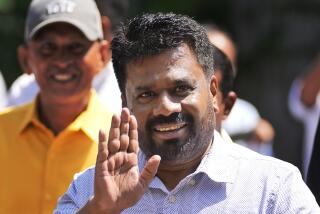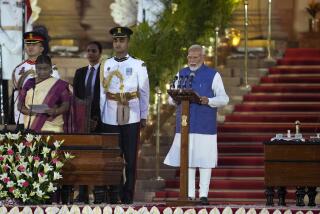Conservative party wins big in India election

- Share via
Reporting from Mumbai, India — India’s conservative Bharatiya Janata Party won an overwhelming victory Friday in national elections, riding a message of clean, business-friendly governance to a historic parliamentary majority that could profoundly change the direction of the world’s largest democracy.
Voters handed the Hindu nationalist party a mandate more sweeping than even some of its staunchest supporters expected. As votes were being counted in the late afternoon, the BJP had won or was leading in 280 races, comfortably above the 272 seats needed for a majority on its own, the first time a sole Indian party has achieved that since 1984.
It was a rare electoral landslide in a fractious political system whose governments are usually formed by shaky coalitions, and it reflected a nationwide wave of support for the BJP’s charismatic, controversial leader, Narendra Modi, who will become India’s next prime minister.
“India has won!” Modi tweeted just after noon Indian time, and added a BJP slogan: “Good days are coming.”
The results were a devastating setback for the governing Indian National Congress, the party of the Nehru-Gandhi family that has led India for most of its post-independence history. Buffeted by corruption scandals and a perceived lack of leadership, the Congress party was poised to win fewer than 50 seats, by far its worst ever showing.
Congress leaders congratulated Modi and the BJP on their apparent victory.
“I hold myself responsible for what has happened,” Rahul Gandhi, the Congress standard-bearer and great-grandson of former prime minister Jawaharlal Nehru, said in brief remarks at party headquarters in New Delhi.
Modi, 63, for more than a decade the chief executive of the western state of Gujarat, ran on a platform of efficient, pro-business governance that resonated with Indians fed up with corruption, rising food prices and flagging economic growth under years of Congress rule.
Voters shrugged off the less savory aspects of Modi’s biography, including his alleged role in 2002 communal riots in his state that left at least 1,000 dead, mainly Muslims. In 2005, the United States denied Modi a visa due to allegations that he allowed the killings, but in recent months, as his ascension to India’s top political job seemed to become inevitable, the State Department ended a decade-long boycott of Modi by sending the U.S. ambassador to New Delhi to meet with him.
Modi, who served in a hard-line Hindu paramilitary organization before entering politics, has denied culpability in the riots. During his campaign, he played down his hard-line Hindu past and said that, if elected, he would represent all of India’s 1.2 billion people, a dizzying amalgamation of ethnicities, religious communities, castes and income levels.
With its pre-poll coalition partners, the BJP had catapulted to well over 300 seats in the 545-seat lower house of parliament, nearly double its showing the last election. The margin indicated that Modi, who sidelined political rivals and was accused of authoritarianism while running Gujarat, would have a free hand in naming a government and tackling India’s economic problems – at least for a little while.
“It indicates to me, and certainly to him, that India wants him to be in charge in a way it has not wanted someone in charge in a long time,” said Aakar Patel, a prominent columnist.
More to Read
Sign up for Essential California
The most important California stories and recommendations in your inbox every morning.
You may occasionally receive promotional content from the Los Angeles Times.











